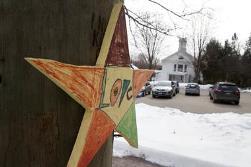Americans see religion in decline yet want more of it. What's up with that?
This year’s poll also asked if society would be better if more Americans were religious. More than three-quarters said yes. Even a majority of those with little or no religious affiliation agreed. This suggests most people look to religion as a necessity during times of social change. Religion, in other words, may appear to gain respect to more people because it offers a comforting role or makes a case for personal sacrifice. Many people, either the faithful or those who are not, see it as both defining goodness and demonstrating it.
Another poll, done for the Christian group LifeWay Research, also finds Americans more open to religion during time of tragedy. Nearly 6 in 10 agree with the poll’s statement, “When a natural disaster occurs, my interest in God increases.”
It is difficult to reconcile these polls with a rising disinterest in institutional religion. A Pew poll last year found 15 percent of American adults say they have no religious affiliation (the “nones,” as they are dubbed). That is about double from four decades ago.
These numbers, however, probably reflect a growing distrust in almost all institutions, not just established denominations, as well as a rising interest in individual spirituality more than group worship or faith-impelled social action.
“When we put it all together,” says Mr. Newport, “we get the image of a basically religious American population whose underlying religiousness has not changed a lot in recent decades.” As more researchers are finding out, when people search for an understanding of God, they are more honest, generous, and loving. They try to be less controlled by appetites. And society benefits.

